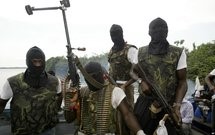 Militancy is part of Nigeria's national fabric. Whereas it was once a means of expressing political grievance, it has become a tactic militant groups and their civilian benefactors use to acquire and defend political power.
Militancy is part of Nigeria's national fabric. Whereas it was once a means of expressing political grievance, it has become a tactic militant groups and their civilian benefactors use to acquire and defend political power.
Militancy flourishes in Nigeria because political advancement requires it. In years past, groups achieved power through military coups. In fact, competing factions of the Nigerian military have ruled the country for most of its post-independence history. But Nigerian politicians did not discriminate between powerful civilian and military leaders; they distrusted them equally. Their fear of being excluded forced them to consolidate whatever power they had. Resorting to violence was one of the best ways to ensure their inclusion. And ever since the country transitioned to civilian rule in 1999, politicians have turned to militant groups to extort the government.
Moving to civilian and democratic rule was always going to be difficult in Nigeria. To help ease the process, a power-sharing system was established, dividing the country into six regions: the South-East, South-South, South-West, North-East, North-Central and North-West. Each region would take turns holding power in the most important federal positions. What succeeded the military under the power-sharing agreement was the People's Democratic Party, an umbrella organization with no particular ideology that has ruled the country since 1999. The party absorbed the country's major ethnic, religious and regional interest groups to ensure that all had a share in power. The system was designed to safeguard and sustain the country's democratic transition by preventing a single interest group from monopolizing power.
In 1999, it was clear which regions would pilot the new system. The South-West zone, represented by Olusegun Obasanjo, would occupy the presidency. A former general and military leader, Obasanjo could speak to and defend the interests of incoming southerners as well as outgoing northerners, who dominated Nigeria's military juntas. The vice presidency went to Atiku Abubakar, a northeasterner whose business background and relationships with traditional elites in northern Nigeria gave him considerable influence across the country.
However, while initial agreements stabilized the 1999 democratic transition, it was unclear how the system would function later. So Nigerian politicians seized the opportunity to advance their interests and careers by using the preferred method of activating militant groups.
Militancy from the Niger Delta to the Northeast
In the mid-2000s, the Niger Delta region took militancy to a whole new level. Sandwiched between the Yoruba tribe of the South-West, the Igbo tribe of the South-East and the Hausa-Fulani of the north, the tribes of the Niger Delta had long felt neglected by the government in Abuja. But they had what the other regions did not: large oil and natural gas reserves, the most important aspect of the country's economy.
At the forefront of the militant campaign was the Movement for the Emancipation of the Niger Delta and the Niger Delta People's Volunteer Force. These groups effectively held the Nigerian economy hostage by blowing up oil pipelines, kidnapping foreign workers and stealing and selling crude oil on the black market -- all on behalf of the Niger Delta political elite who sponsored them. The price Abuja would have to pay to end the attacks and economic disruptions was political inclusion for Niger Delta politicians.
Their ploy worked. In 2006, Goodluck Jonathan, the governor of Bayelsa state in the Niger Delta, was selected as the vice presidential candidate of the People's Democratic Party. He was elected to the post in April 2007.
But in 2010, in an event the original power-sharing agreement was unprepared for, then-President Umaru Yaradua, a northern Muslim of the Hausa-Fulani tribe, died of natural causes, leaving Jonathan to serve the remainder of his term as acting president until 2011. He then won the 2011 presidential contest. During his tenure, Niger Delta militants were paid off, and attacks were brought nearly to a standstill.
The problem is that Jonathan's ascension broke down the power-sharing system. He was never meant to serve as president; Yaradua was supposed to occupy the office until 2015, at which point his region and Jonathan's would have been rotated out of power. Instead of holding the presidency for two four-year terms, the north held it for only three years. The Niger Delta has held it for nine years, excluding the vice presidency. This is the very concentration of power the transition to civilian rule was meant to prevent.
Unsurprisingly, militancy in northern Nigeria has escalated in the past nine years, much as it did in the Niger Delta before Jonathan went to Abuja. The group responsible for most of the recent violence is Boko Haram, an Islamist militant group that has ransacked the north for the past few years. Ironically, the group's insurgency will abate only by the grace of northern politicians, whose fate rests in the hands of Nigerian voters.
Editor's Note: This is the first installment in a three-part series explaining how one of Africa's most wealthy nations became a mainstay for armed militias. Part 1 discusses the political circumstances that engendered militancy. Part 2 examines Boko Haram, perhaps the most infamous group operating in the country today. Part 3 discusses how the 2015 presidential election will determine the future of Boko Haram's insurgency.
Courtesy : Stratfor (www.stratfor.com)